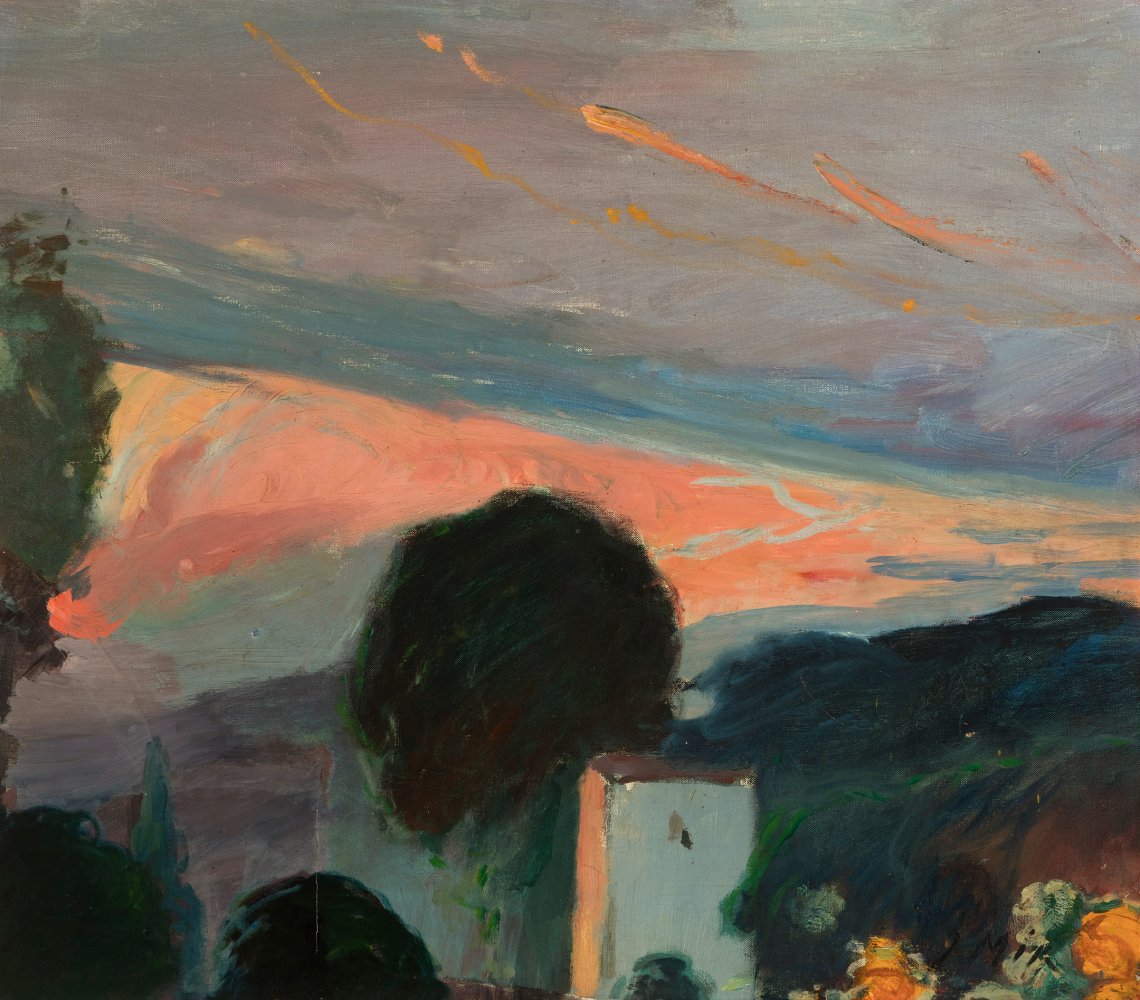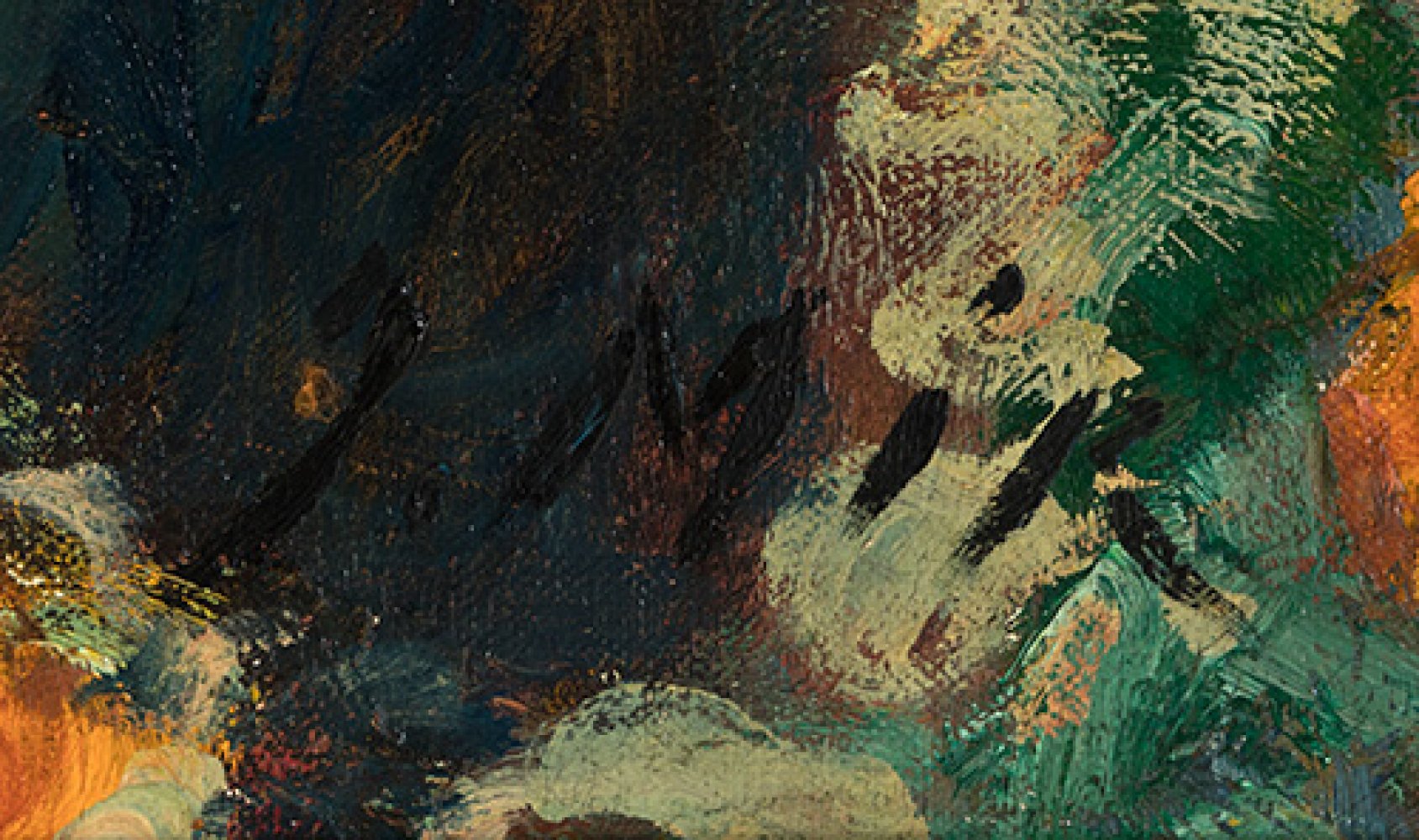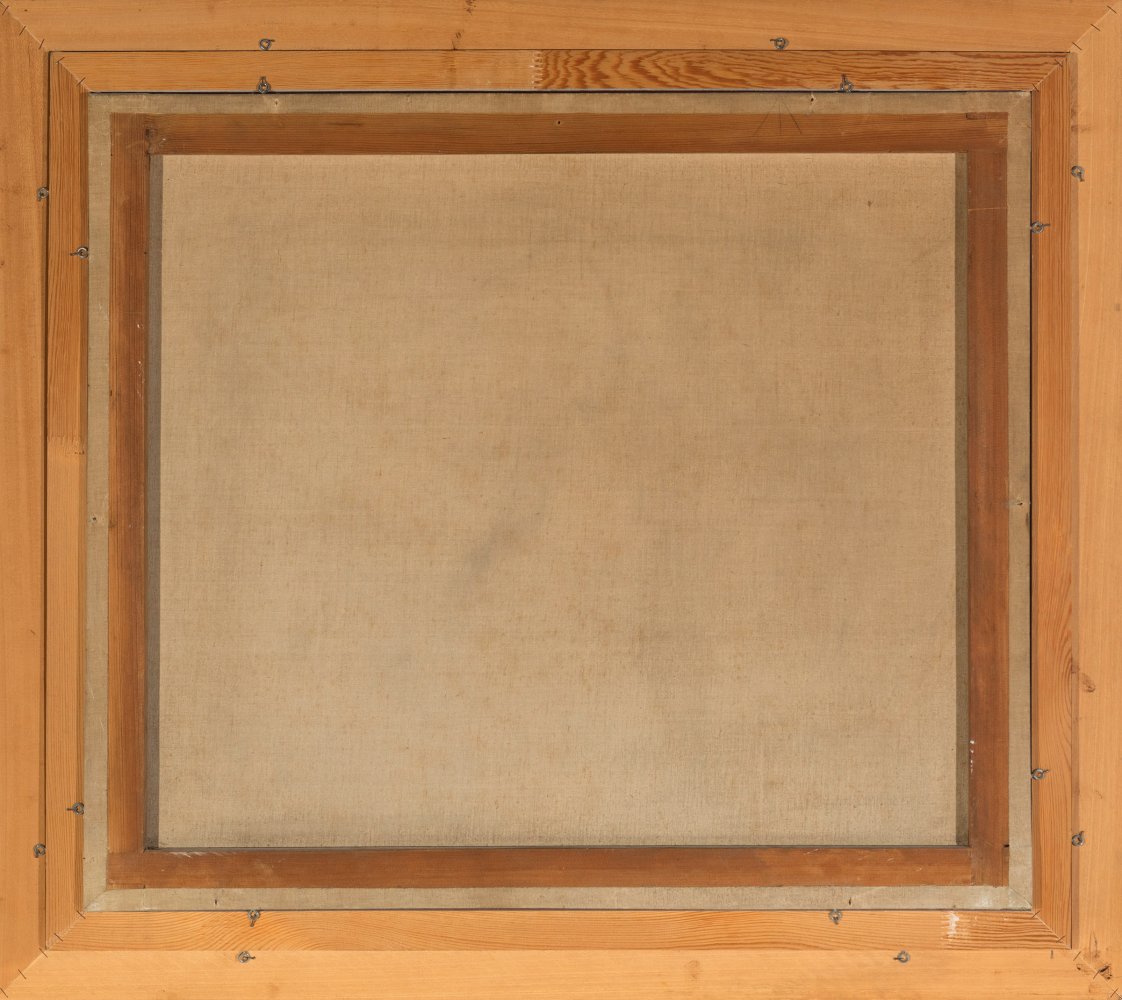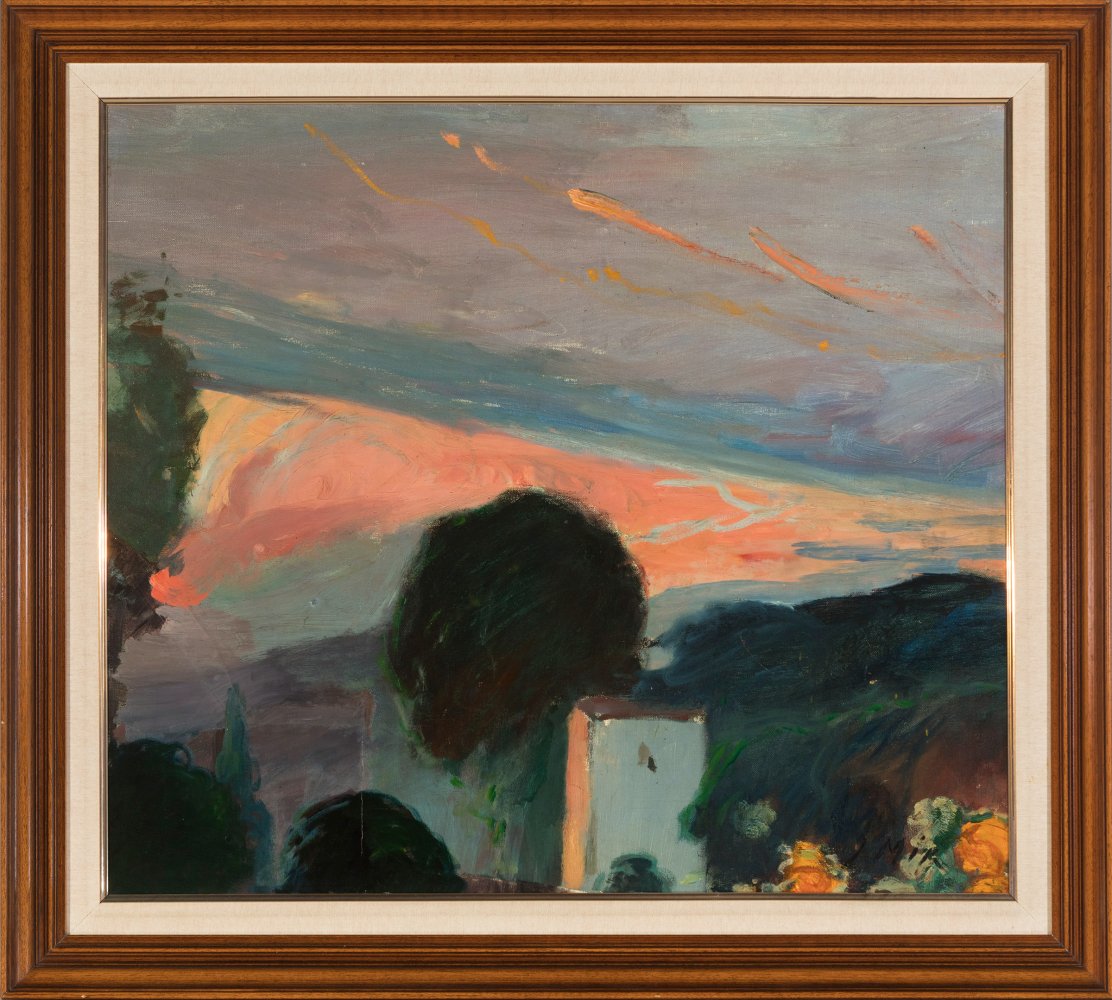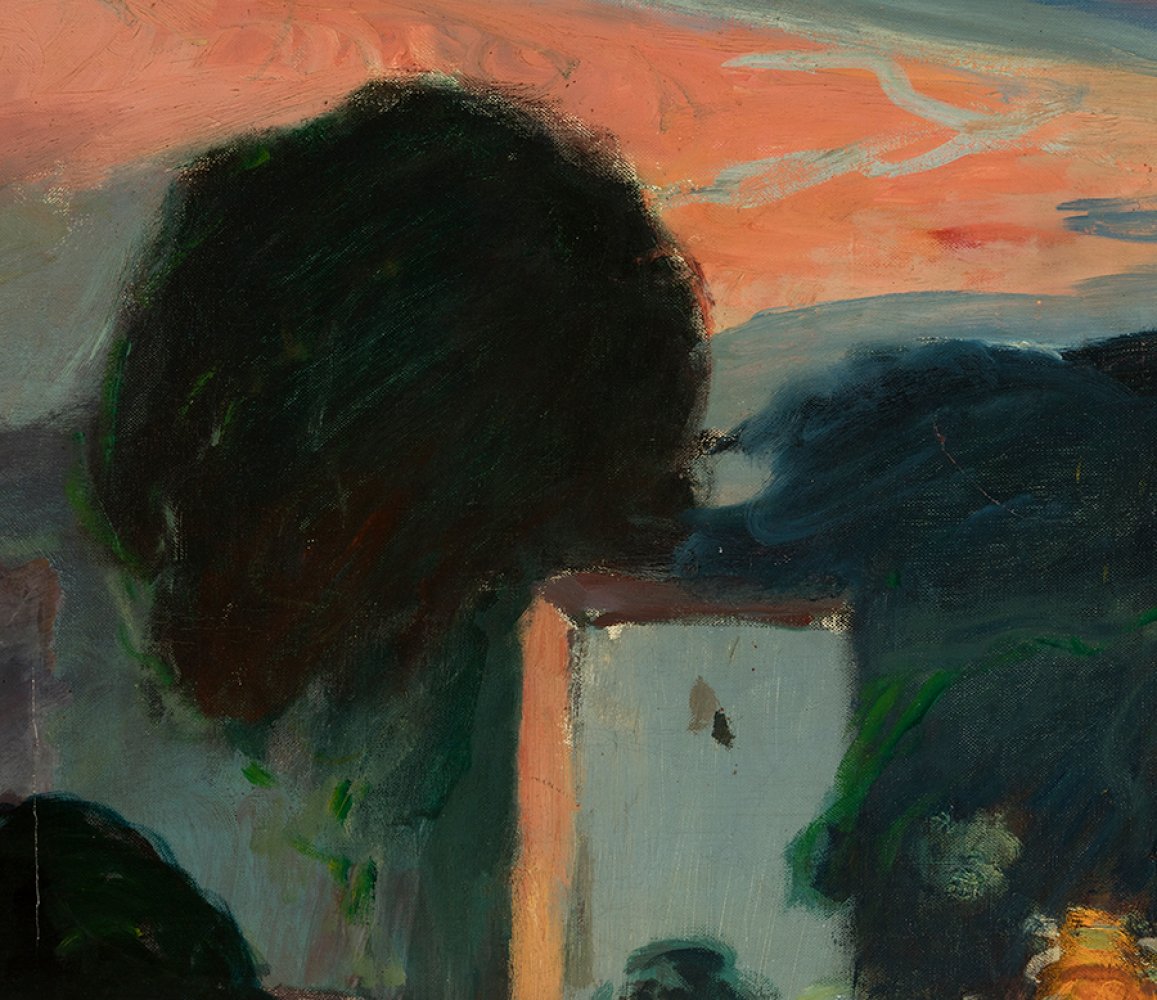16
JOAQUIM MIR TRINXET (Barcelona, 1873 - 1940)."Sunset".Oil on canvas.Relined.Signed in the lower
1/5
Description
JOAQUIM MIR TRINXET (Barcelona, 1873 - 1940).
"Sunset".
Oil on canvas.
Relined.
Signed in the lower right corner.
Attached certificate of Dr. Joan Campana Tubon.
It presents a patch in the left inferior zone.
Measurements: 75 x 87 cm; 93 x 105 cm (frame).
In this painting by Joaquim Mir, the wide sky takes centre stage, opening up in the bluish vault a deep crimson caesura. Likewise, the light at twilight falls on the landscape with its small chapel, unfolding a daring symphony of emerald greens and bright yellows between shady hollows. Joaquim Mir reduces nature to its basic elements through an excellent handling of light and colour, but at the same time he avoids abstraction, always suggesting the pulse that beats beneath the forms.
Joaquim Mir studied at the San Jordi School of Fine Arts in Barcelona and in the studio of the painter Luis Graner. He soon felt uncomfortable with the official teaching, which was anchored in a conception of realist painting, and so in 1893 he founded the "Colla del Safrà" (Safrà Group) with other colleagues to explore together the pictorial initiatives of the end of the century. In 1896 they even participated as a group in the 3rd Exhibition of Fine Arts and Artistic Industries, to which Mir submitted two works: "La huerta del rector" ("The Rector's Vegetable Garden") and "El vendedor de naranjas" ("The Orange Seller"). From 1897 he also frequented the artistic environment of "Els Quatre Gats", which helped him to mature in the compositional study of landscapes with figures in different planes of depth. During these years he took part in the Fine Arts Exhibitions in Barcelona in 1894, 1896 and 1898. Winner of a second medal at the Madrid Exhibition of 1899, that same year he moved to the capital with the aim of applying for a scholarship in Rome. When he was unsuccessful, he went with Santiago Rusiñol to Mallorca, a trip that was to be a definitive turning point in his career. Mir was dazzled by the Mallorcan landscape, which was an inexhaustible source of inspiration for him. From then on, the artist deployed a whole combination of impossible colours, the result of his personal interpretation of the island's majestic nature. The brushstrokes grew longer and became stains that almost made objects and spatial references disappear. In 1901 he exhibited the fruit of this first Mallorcan period in a solo exhibition at the Sala Parés in Barcelona, and again won a second medal at the National Exhibition. In 1907 he won the first medal at the International Exhibition of Fine Arts in Barcelona. From then on, settled in Camp de Tarragona, he did not move away from the landscape genre, but now it was the surrounding villages that were the protagonists of his painting. He gained definitive national recognition in 1917, when he was awarded the National Prize for Fine Arts. In 1929 he won the first medal at the International Exhibition in Barcelona. The following year he won the medal of honour at the National Exhibition in Madrid, a prize he had been pursuing since 1922. Although he was mainly a native painter, he held solo and group exhibitions in Washington, Paris, Pittsburgh, New York, Philadelphia, Amsterdam, Buenos Aires and Venice. Mir is today considered the foremost representative of Spanish Post-Impressionist landscape painting. His work can be found in the Museo Nacional de Arte de Cataluña, the Museo del Prado, the Museo Thyssen-Bornemisza and the Museo Reina Sofía in Madrid, among many others.
"Sunset".
Oil on canvas.
Relined.
Signed in the lower right corner.
Attached certificate of Dr. Joan Campana Tubon.
It presents a patch in the left inferior zone.
Measurements: 75 x 87 cm; 93 x 105 cm (frame).
In this painting by Joaquim Mir, the wide sky takes centre stage, opening up in the bluish vault a deep crimson caesura. Likewise, the light at twilight falls on the landscape with its small chapel, unfolding a daring symphony of emerald greens and bright yellows between shady hollows. Joaquim Mir reduces nature to its basic elements through an excellent handling of light and colour, but at the same time he avoids abstraction, always suggesting the pulse that beats beneath the forms.
Joaquim Mir studied at the San Jordi School of Fine Arts in Barcelona and in the studio of the painter Luis Graner. He soon felt uncomfortable with the official teaching, which was anchored in a conception of realist painting, and so in 1893 he founded the "Colla del Safrà" (Safrà Group) with other colleagues to explore together the pictorial initiatives of the end of the century. In 1896 they even participated as a group in the 3rd Exhibition of Fine Arts and Artistic Industries, to which Mir submitted two works: "La huerta del rector" ("The Rector's Vegetable Garden") and "El vendedor de naranjas" ("The Orange Seller"). From 1897 he also frequented the artistic environment of "Els Quatre Gats", which helped him to mature in the compositional study of landscapes with figures in different planes of depth. During these years he took part in the Fine Arts Exhibitions in Barcelona in 1894, 1896 and 1898. Winner of a second medal at the Madrid Exhibition of 1899, that same year he moved to the capital with the aim of applying for a scholarship in Rome. When he was unsuccessful, he went with Santiago Rusiñol to Mallorca, a trip that was to be a definitive turning point in his career. Mir was dazzled by the Mallorcan landscape, which was an inexhaustible source of inspiration for him. From then on, the artist deployed a whole combination of impossible colours, the result of his personal interpretation of the island's majestic nature. The brushstrokes grew longer and became stains that almost made objects and spatial references disappear. In 1901 he exhibited the fruit of this first Mallorcan period in a solo exhibition at the Sala Parés in Barcelona, and again won a second medal at the National Exhibition. In 1907 he won the first medal at the International Exhibition of Fine Arts in Barcelona. From then on, settled in Camp de Tarragona, he did not move away from the landscape genre, but now it was the surrounding villages that were the protagonists of his painting. He gained definitive national recognition in 1917, when he was awarded the National Prize for Fine Arts. In 1929 he won the first medal at the International Exhibition in Barcelona. The following year he won the medal of honour at the National Exhibition in Madrid, a prize he had been pursuing since 1922. Although he was mainly a native painter, he held solo and group exhibitions in Washington, Paris, Pittsburgh, New York, Philadelphia, Amsterdam, Buenos Aires and Venice. Mir is today considered the foremost representative of Spanish Post-Impressionist landscape painting. His work can be found in the Museo Nacional de Arte de Cataluña, the Museo del Prado, the Museo Thyssen-Bornemisza and the Museo Reina Sofía in Madrid, among many others.
Auction Details
Shipping
T&Cs & Important Info
Ask seller a question
JOAQUIM MIR TRINXET (Barcelona, 1873 - 1940).
"Sunset".
Oil on canvas.
Relined.
Signed in the lower right corner.
Attached certificate of Dr. Joan Campana Tubon.
It presents a patch in the left inferior zone.
Measurements: 75 x 87 cm; 93 x 105 cm (frame).
In this painting by Joaquim Mir, the wide sky takes centre stage, opening up in the bluish vault a deep crimson caesura. Likewise, the light at twilight falls on the landscape with its small chapel, unfolding a daring symphony of emerald greens and bright yellows between shady hollows. Joaquim Mir reduces nature to its basic elements through an excellent handling of light and colour, but at the same time he avoids abstraction, always suggesting the pulse that beats beneath the forms.
Joaquim Mir studied at the San Jordi School of Fine Arts in Barcelona and in the studio of the painter Luis Graner. He soon felt uncomfortable with the official teaching, which was anchored in a conception of realist painting, and so in 1893 he founded the "Colla del Safrà" (Safrà Group) with other colleagues to explore together the pictorial initiatives of the end of the century. In 1896 they even participated as a group in the 3rd Exhibition of Fine Arts and Artistic Industries, to which Mir submitted two works: "La huerta del rector" ("The Rector's Vegetable Garden") and "El vendedor de naranjas" ("The Orange Seller"). From 1897 he also frequented the artistic environment of "Els Quatre Gats", which helped him to mature in the compositional study of landscapes with figures in different planes of depth. During these years he took part in the Fine Arts Exhibitions in Barcelona in 1894, 1896 and 1898. Winner of a second medal at the Madrid Exhibition of 1899, that same year he moved to the capital with the aim of applying for a scholarship in Rome. When he was unsuccessful, he went with Santiago Rusiñol to Mallorca, a trip that was to be a definitive turning point in his career. Mir was dazzled by the Mallorcan landscape, which was an inexhaustible source of inspiration for him. From then on, the artist deployed a whole combination of impossible colours, the result of his personal interpretation of the island's majestic nature. The brushstrokes grew longer and became stains that almost made objects and spatial references disappear. In 1901 he exhibited the fruit of this first Mallorcan period in a solo exhibition at the Sala Parés in Barcelona, and again won a second medal at the National Exhibition. In 1907 he won the first medal at the International Exhibition of Fine Arts in Barcelona. From then on, settled in Camp de Tarragona, he did not move away from the landscape genre, but now it was the surrounding villages that were the protagonists of his painting. He gained definitive national recognition in 1917, when he was awarded the National Prize for Fine Arts. In 1929 he won the first medal at the International Exhibition in Barcelona. The following year he won the medal of honour at the National Exhibition in Madrid, a prize he had been pursuing since 1922. Although he was mainly a native painter, he held solo and group exhibitions in Washington, Paris, Pittsburgh, New York, Philadelphia, Amsterdam, Buenos Aires and Venice. Mir is today considered the foremost representative of Spanish Post-Impressionist landscape painting. His work can be found in the Museo Nacional de Arte de Cataluña, the Museo del Prado, the Museo Thyssen-Bornemisza and the Museo Reina Sofía in Madrid, among many others.
"Sunset".
Oil on canvas.
Relined.
Signed in the lower right corner.
Attached certificate of Dr. Joan Campana Tubon.
It presents a patch in the left inferior zone.
Measurements: 75 x 87 cm; 93 x 105 cm (frame).
In this painting by Joaquim Mir, the wide sky takes centre stage, opening up in the bluish vault a deep crimson caesura. Likewise, the light at twilight falls on the landscape with its small chapel, unfolding a daring symphony of emerald greens and bright yellows between shady hollows. Joaquim Mir reduces nature to its basic elements through an excellent handling of light and colour, but at the same time he avoids abstraction, always suggesting the pulse that beats beneath the forms.
Joaquim Mir studied at the San Jordi School of Fine Arts in Barcelona and in the studio of the painter Luis Graner. He soon felt uncomfortable with the official teaching, which was anchored in a conception of realist painting, and so in 1893 he founded the "Colla del Safrà" (Safrà Group) with other colleagues to explore together the pictorial initiatives of the end of the century. In 1896 they even participated as a group in the 3rd Exhibition of Fine Arts and Artistic Industries, to which Mir submitted two works: "La huerta del rector" ("The Rector's Vegetable Garden") and "El vendedor de naranjas" ("The Orange Seller"). From 1897 he also frequented the artistic environment of "Els Quatre Gats", which helped him to mature in the compositional study of landscapes with figures in different planes of depth. During these years he took part in the Fine Arts Exhibitions in Barcelona in 1894, 1896 and 1898. Winner of a second medal at the Madrid Exhibition of 1899, that same year he moved to the capital with the aim of applying for a scholarship in Rome. When he was unsuccessful, he went with Santiago Rusiñol to Mallorca, a trip that was to be a definitive turning point in his career. Mir was dazzled by the Mallorcan landscape, which was an inexhaustible source of inspiration for him. From then on, the artist deployed a whole combination of impossible colours, the result of his personal interpretation of the island's majestic nature. The brushstrokes grew longer and became stains that almost made objects and spatial references disappear. In 1901 he exhibited the fruit of this first Mallorcan period in a solo exhibition at the Sala Parés in Barcelona, and again won a second medal at the National Exhibition. In 1907 he won the first medal at the International Exhibition of Fine Arts in Barcelona. From then on, settled in Camp de Tarragona, he did not move away from the landscape genre, but now it was the surrounding villages that were the protagonists of his painting. He gained definitive national recognition in 1917, when he was awarded the National Prize for Fine Arts. In 1929 he won the first medal at the International Exhibition in Barcelona. The following year he won the medal of honour at the National Exhibition in Madrid, a prize he had been pursuing since 1922. Although he was mainly a native painter, he held solo and group exhibitions in Washington, Paris, Pittsburgh, New York, Philadelphia, Amsterdam, Buenos Aires and Venice. Mir is today considered the foremost representative of Spanish Post-Impressionist landscape painting. His work can be found in the Museo Nacional de Arte de Cataluña, the Museo del Prado, the Museo Thyssen-Bornemisza and the Museo Reina Sofía in Madrid, among many others.
31st August -19th & 20th Century Arts
Sale Date(s)
Venue Address
Aragón 346, Barcelona
Calle Velázquez 7, Madrid
Carrer de Cirilo Amorós 55, Valencia
Barcelona
08009
Spain
General delivery information available from the auctioneer
Setdart offers Worldwide shipping
PICK UP IN ROOM: You can come and pick up your lots in our offices (Barcelona, Madrid or Valencia). At the moment of the withdrawal, you will be able to accept the current conditions of the lot by means of a document that you will sign.
YOU CAN SEND ANOTHER PERSON TO PICK UP: This person must present a signed authorization that you can find in our web page by accessing from BUY AT SETDART- LOGISTICS-DOWNLOAD AUTHORIZATION DOCUMENT. You can also send an e-mail with the requested data in AUTHORIZATION DOCUMENT to admin@setdart.com
Important Information
25% buyer´s premium
21% buyer´s premium at www.setdart.com











